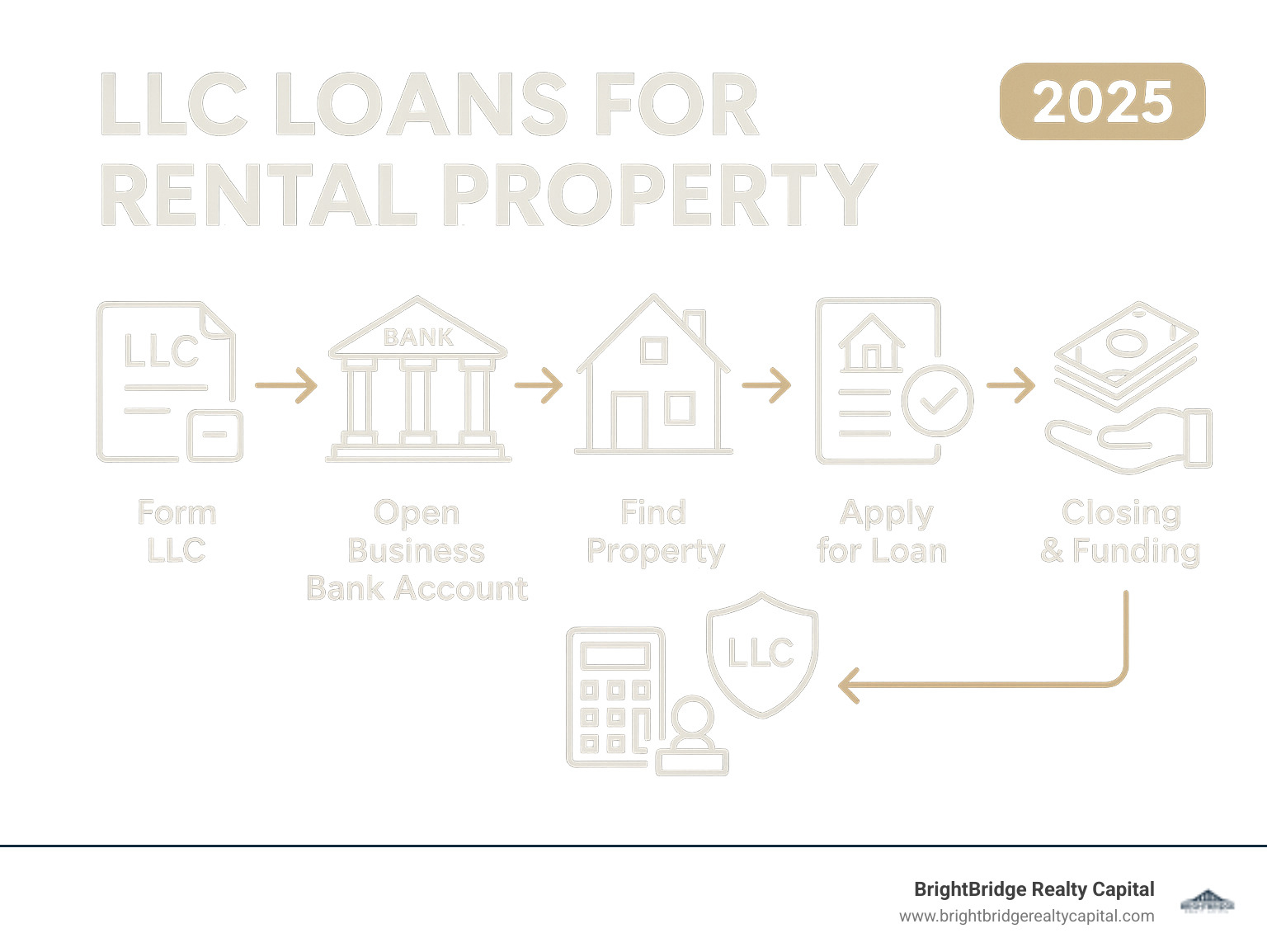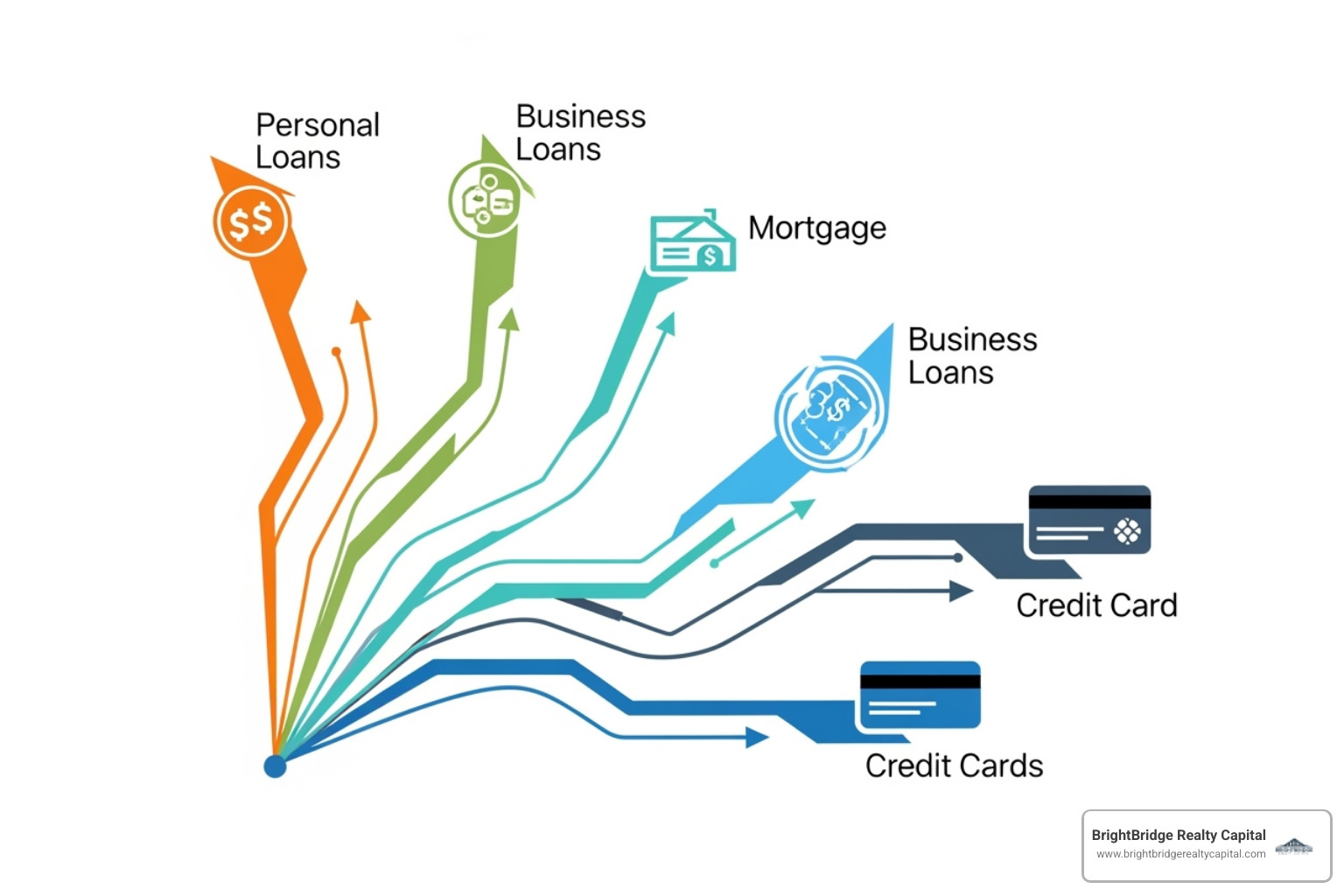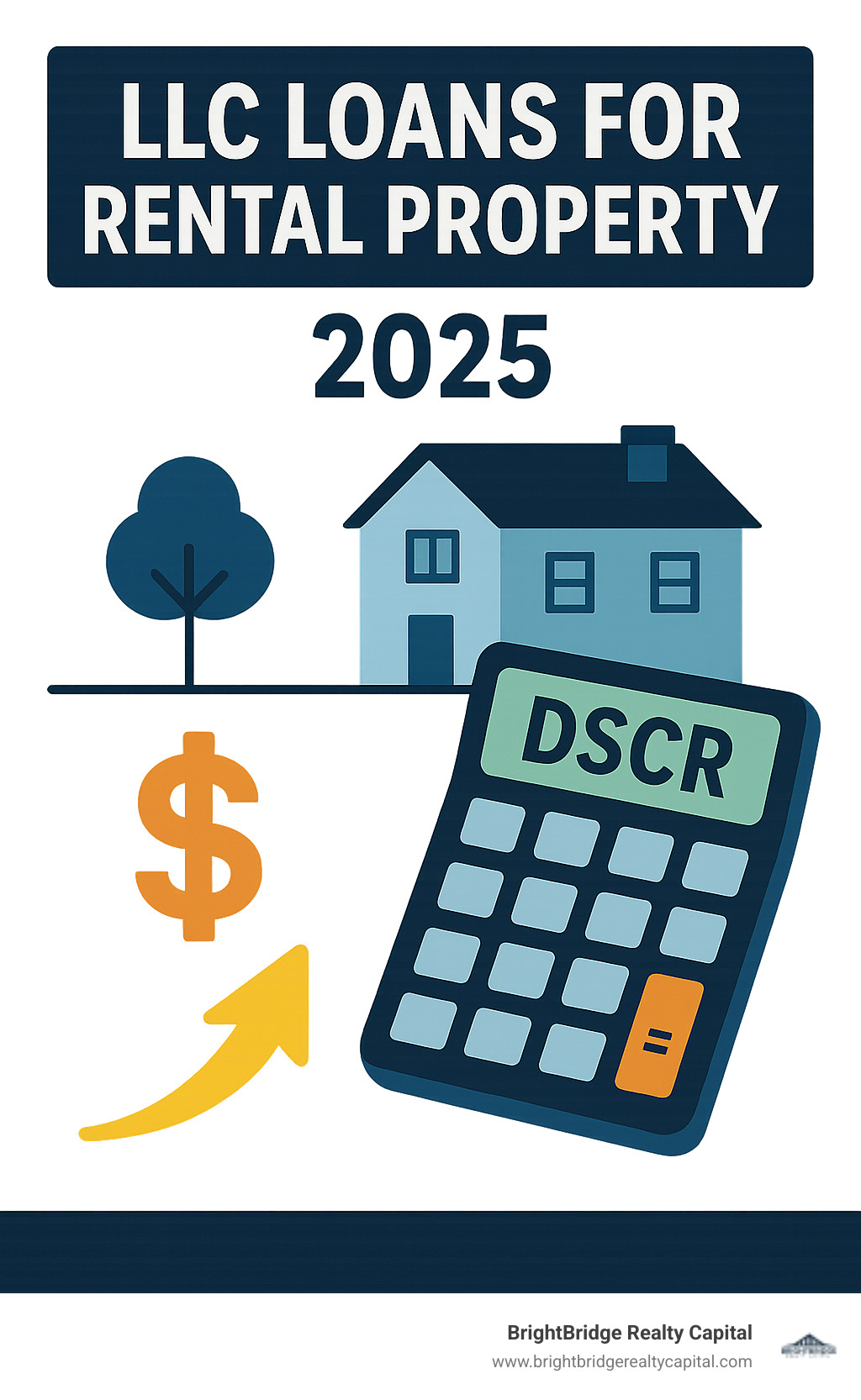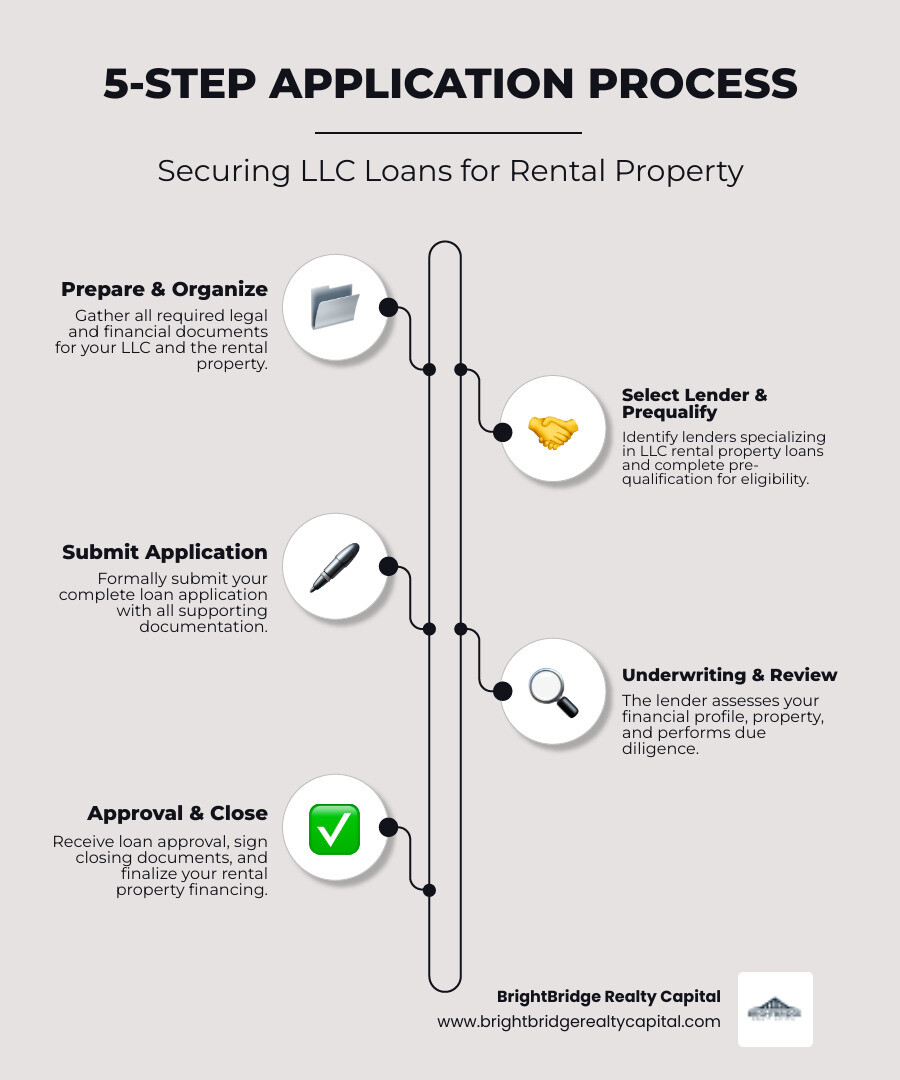LLC Loans Made Easy – Financing Your Rental Empire

What Are LLC Loans for Rental Properties?
LLC loans for rental property are specialized financing solutions designed specifically for Limited Liability Companies (LLCs) to acquire, refinance, or expand their real estate investment portfolios. Unlike traditional personal mortgages, which primarily assess an individual's income, credit history, and debt-to-income ratio, these loans are underwritten with a primary focus on the LLC's business profile and, crucially, the income-generating potential of the property itself. This distinction is vital for serious real estate investors looking to scale their operations.
Quick Overview of LLC Rental Property Loans:
- What they are: Business loans custom for LLCs to purchase or refinance rental properties, including single-family homes, multi-family units, and even small commercial properties.
- Key benefit: Provides a robust legal and financial barrier, protecting personal assets from business liabilities and potential lawsuits arising from the rental property.
- Typical down payment: Generally ranges from 20-25% of the purchase price, reflecting the commercial nature of these loans compared to lower down payments often seen in owner-occupied residential mortgages.
- Credit requirements: While the LLC is the borrower, the personal credit score of the managing members is still a factor, typically requiring a minimum of 670+, though some specialized loans like DSCR can be more flexible.
- Common loan types: Includes DSCR (Debt Service Coverage Ratio) loans, conventional commercial loans from banks, and short-term solutions like hard money loans, each suited for different investment strategies.
- Loan terms: For long-term financing, terms commonly range from 15 to 30 years, providing stability and predictable payments for cash flow management.
- Personal guarantee: Often required, especially for new or smaller LLCs, meaning the individual owners are personally liable for the debt if the LLC defaults, though non-recourse options exist for larger, more established portfolios.
This business structure is incredibly popular with real estate investors because it offers a strategic pathway to grow a rental empire with proper legal protection and significant financial advantages. Whether you're looking to shield your personal assets from potential lawsuits, take advantage of pass-through taxation, or build business credit separate from your personal finances, LLC loans offer a structured and secure method to achieve your investment goals.
Why investors choose LLC loans:
- Asset protection: This is paramount. By holding properties within an LLC, your personal assets (such as your primary residence, savings, and other investments) are legally separated and protected from liabilities, claims, or lawsuits related to your rental properties.
- Tax advantages: LLCs offer flexible taxation. They can be taxed as a sole proprietorship, partnership, or even an S-corp or C-corp, allowing for pass-through taxation that avoids double taxation and enables the deduction of numerous business expenses, significantly reducing taxable income.
- Business credit building: Operating as an LLC allows you to establish a credit history for your business entity, independent of your personal credit. This can lead to better loan terms, higher borrowing limits, and more favorable financing options as your portfolio grows.
- Partnership flexibility: LLCs provide an ideal framework for multiple owners. An operating agreement can easily define ownership percentages, roles, responsibilities, and profit distribution, simplifying complex partnership arrangements and facilitating easier estate planning.
At BrightBridge Realty Capital, we specialize in helping investors structure LLC loans for rental property that not only protect their personal assets but also provide the necessary capital to build and expand their portfolios efficiently. The right loan structure can truly make the difference between a successful, stress-free investment journey and a financially burdensome one.

Why Use an LLC for Your Rental Property Empire?
Investing in rental properties is a fantastic way to generate passive income and build long-term wealth, but it inherently comes with risks. Using a Limited Liability Company (LLC) is a strategic and often indispensable tool for protecting your personal assets and streamlining your investment operations, providing a robust legal and financial framework for your real estate ventures.

The Shield of Limited Liability
In the field of real estate, lawsuits are an unfortunate but real possibility. Whether it's a tenant injury, property damage, or a dispute with a contractor, the "limited liability" in LLC acts as an impenetrable shield. By holding your rental property under an LLC, you create a distinct legal separation between your personal assets (such as your primary home, personal savings, vehicles, and other investments) and your business liabilities. If a lawsuit arises from your rental property, the claim is directed against the LLC itself, not against you personally. This limited personal liability is unequivocally the top reason savvy investors choose to operate their rental businesses through an LLC, safeguarding their personal wealth from unforeseen business risks.
To maintain this crucial liability protection, it is absolutely vital to adhere to corporate formalities, especially avoiding any commingling of funds. This means keeping business and personal finances strictly separate, using dedicated business bank accounts for all rental property income and expenses. This separation is not only critical for liability protection but also provides the clear, auditable financial tracking that lenders demand when you seek LLC loans for rental property, demonstrating the financial health and legitimacy of your business.
While an LLC offers strong protection, a court can, in rare circumstances, "pierce the corporate veil" if business formalities are consistently ignored or if the LLC is used for fraudulent purposes. To further fortify your defenses, many investors also wisely invest in an umbrella insurance policy, which provides additional layers of liability coverage beyond what your standard property insurance might offer, acting as an extra safety net for significant claims.
Tax Advantages and Pass-Through Taxation
LLCs offer compelling tax advantages that can significantly boost your investment returns. Most notably, they benefit from "pass-through taxation." Unlike C-corporations, which are subject to double taxation (first at the corporate level on profits, and then again when those profits are distributed to shareholders as dividends), an LLC's net profits or losses are passed directly through to the individual members. You report this income or loss on your personal tax return, often on Schedule E of Form 1040 for rental real estate, ensuring that the income is only taxed once at your individual income tax rate. This avoids the inefficiency of double taxation.
Furthermore, owning property through an LLC allows you to deduct a wide array of legitimate business expenses, which can significantly reduce your overall taxable income. These deductions can include mortgage interest, property taxes, insurance premiums, maintenance and repair costs, professional fees (e.g., legal, accounting, property management), advertising expenses, and even travel related to your rental business. Another powerful tax advantage is depreciation, which allows you to deduct a portion of the property's value each year, even if the property is appreciating in market value. These deductions can create substantial tax savings, improving your cash flow. We always recommend consulting a qualified tax professional to ensure compliance and to maximize these benefits for your specific financial situation.
Credibility, Privacy, and Partnership Flexibility
Operating your real estate ventures as an LLC lends a significant degree of professionalism and credibility. This can lead to better deals, more favorable terms from suppliers and contractors, and a more serious perception from lenders and other business partners. An LLC signals that you are running a legitimate, structured business, not just a hobby. Depending on the state of formation (some states like Wyoming or Delaware offer improved privacy provisions), an LLC can also offer improved privacy by not publicly associating your personal name directly with the property's ownership, which can be a valuable benefit for high-net-worth individuals or those seeking to keep their investment activities discreet.
If you're investing with partners, an LLC provides unparalleled flexibility and clarity. A well-drafted operating agreement, which is the foundational document of an LLC, can carefully structure ownership percentages, define roles and responsibilities for each member, allocate profits and losses, and outline decision-making processes. This legal framework simplifies partnership investing, mitigates potential disputes, and facilitates smoother transitions for estate planning or changes in ownership. Resources like the 50-State Guide to Forming an LLC can help you steer the initial setup process, ensuring your foundation is solid for future growth.
Exploring Your Financing Options: A Guide to LLC Loans for Rental Property
When your LLC is the borrower, the landscape of loan products shifts significantly from residential mortgages to the more specialized field of business or commercial lending. Understanding these diverse options is paramount to effectively financing your properties and optimizing your investment strategy.

Conventional and Commercial Bank Loans
Traditional banks, both large national institutions and smaller community banks, offer conventional commercial real estate loans specifically designed for LLCs. These loans differ substantially from personal home loans. They typically require a higher down payment, often ranging from 20-25%, reflecting the increased risk perception for investment properties compared to owner-occupied homes. Loan terms commonly span 15 to 30 years, providing long-term stability for cash flow planning. Underwriting for these loans is generally stricter and more comprehensive; lenders will scrutinize not only your LLC's financial statements and operating history but also your personal financial history, and critically, the property's projected cash flow and market viability. Smaller community banks and local savings & loans can sometimes offer more flexible terms or a more personalized approach than large national banks, especially if you have an established banking relationship with them. They often have a deeper understanding of local market conditions. For more detailed insights into various rental property financing options, you can check out our page on rental loans.
Hard Money and Bridge Loans
For real estate investors who prioritize speed and flexibility, particularly for time-sensitive deals or properties requiring significant rehabilitation, hard money and bridge loans are excellent short-term financing solutions. These loans typically have much shorter terms, ranging from 6 months to 3 years. They are ideally suited for fix-and-flip projects, properties purchased at auction, or those needing substantial renovation before they can be rented or refinanced into long-term debt. The primary focus of hard money lenders is on the property's intrinsic value and its potential after improvements, rather than the borrower's credit score or income. This asset-based lending approach allows for significantly faster approvals and closings, often within days or a couple of weeks. However, this speed and flexibility come with a trade-off: higher interest rates compared to conventional loans, as they are designed to "bridge the gap" until the property is stabilized and qualifies for more traditional, long-term financing. Our fix-and-flip loans at BrightBridge Realty Capital are specifically custom for these types of rapid-turnaround scenarios.
Portfolio and Blanket Loans
As your real estate investment portfolio expands, managing individual mortgages for each property can become cumbersome and inefficient. This is where portfolio and blanket loans become invaluable. A portfolio loan is a loan that a lender chooses to keep on its own books rather than selling it on the secondary market, allowing for greater flexibility in underwriting and terms. A blanket loan, a specific type of portfolio loan, allows you to finance multiple properties under a single loan agreement. This significantly simplifies paperwork, reduces closing costs across multiple properties, and streamlines management. However, it often involves "cross-collateralization," meaning all properties included in the blanket loan serve as collateral for the entire debt. While this can be a powerful tool for scaling your portfolio, it also increases risk; if one property underperforms or defaults, all properties under the blanket loan could be at risk. These loans are typically offered by specialized investment property lenders who understand the unique needs of portfolio investors.
Why SBA Loans Typically Don't Apply
A common question among new real estate investors is whether an LLC can secure an SBA loan for a rental property. The answer is generally no. SBA loans, such as the popular 7(a) and 504 programs, are specifically designed to support active, operating small businesses that generate active income, not for passive investments. SBA guidelines explicitly exclude businesses primarily engaged in generating "passive income" from real estate investments. This means that a landlord whose primary business is simply collecting rent and managing properties, without actively occupying or using the assets for an operational business (e.g., a hotel or a self-storage facility where the owner is actively involved in daily operations), will not qualify. While an LLC can certainly obtain an SBA loan for other legitimate business purposes (e.g., buying an owner-occupied office building for a consulting firm), it is not the appropriate tool for financing a portfolio of residential rental properties. You can review the SBA 7(a) & 504 Summary Report for more detailed eligibility criteria.
The Power of DSCR Loans for LLC Real Estate Investors
One of the most transformative and investor-friendly LLC loans for rental property available today is the Debt Service Coverage Ratio (DSCR) loan. At BrightBridge Realty Capital, DSCR loans are our specialty because they effectively address and solve many common challenges and headaches faced by real estate investors. Unlike traditional lending models that demand extensive personal income verification and mountains of paperwork, DSCR loans are in that they recognize and prioritize what truly matters for an investment property: the property's inherent income-generating potential.

How DSCR Loans Work for LLCs
DSCR loans are a type of "Non-Qualified Mortgage" (Non-QM), which means they are not subject to the rigid, often restrictive, underwriting rules of government-backed loans (like Fannie Mae or Freddie Mac). This inherent flexibility is precisely what makes them so ideal for real estate investors. The lender's primary focus shifts from your personal income and tax returns to whether the investment property itself generates sufficient income to comfortably cover its mortgage payments. This is a game-changer for self-employed investors, those with complex tax situations, or anyone who prefers to keep their personal finances private and separate from their business dealings. The underwriting process for DSCR loans is significantly faster and more straightforward because the core question is simple and direct: can this property pay for itself? This property-centric approach streamlines the entire loan application and approval process.
Calculating Your Debt Service Coverage Ratio (DSCR)
The mathematical foundation behind DSCR is neatly simple and provides a clear indicator of a property's financial health:
DSCR = Net Operating Income (NOI) / Total Debt Service
Let's break down these components:
- Net Operating Income (NOI): This is the property's total annual rental income minus its operating expenses. Operating expenses typically include property taxes, insurance, property management fees, maintenance, and vacancy allowances. Crucially, NOI is calculated before any mortgage payments, depreciation, or income taxes are factored in.
- Total Debt Service: This represents the total annual payments for the principal and interest of the mortgage loan.
For a practical example, consider a property that generates $36,000 in annual rental income and incurs $12,000 in annual operating expenses. Its Net Operating Income (NOI) would be $24,000 ($36,000 - $12,000). If the annual mortgage payments (principal and interest) for this property are $19,200, the DSCR calculation would be:
$24,000 (NOI) ÷ $19,200 (Debt Service) = 1.25 DSCR
Most lenders typically require a minimum DSCR of at least 1.25. A DSCR of 1.25 indicates that the property generates 25% more income than is needed to cover its debt payments, providing a comfortable financial buffer against unexpected expenses or periods of vacancy. A higher DSCR is generally viewed more favorably by lenders.
Key Advantages of Using DSCR Loans for your LLC loans for rental property
DSCR loans offer significant and distinct advantages for investors looking to efficiently scale their rental property portfolios:
- Speed: While traditional conventional loans can often take 45-60 days or even longer to close, DSCR loans are renowned for their rapid turnaround times. At BrightBridge Realty Capital, we frequently close DSCR loans in as little as 7-14 days. This speed is a monumental advantage in today's highly competitive real estate market, allowing investors to seize opportunities quickly.
- Streamlined Qualification: The primary focus on property income dramatically simplifies the qualification process. This removes significant barriers for self-employed investors, those with fluctuating income, or individuals with complex tax situations, as personal income documentation is minimized or not required.
- Unlimited Properties: Unlike conventional loans, which often impose strict limits on the number of financed properties an individual can hold (e.g., typically capping at 10 mortgages), there is generally no such limit with DSCR loans. This makes them an ideal financing vehicle for aggressive growth strategies, such as the BRRRR (Buy, Rehab, Rent, Refinance, Repeat) method, enabling investors to continuously expand their portfolios.
- Cash-Out Refinancing: DSCR loans are excellent tools for accessing the equity built up in your existing properties. Through a cash-out refinance, you can easily pull out capital from a seasoned rental property to fund your next investment, acquire additional properties, or cover renovation costs, creating a powerful and self-sustaining cycle of growth and portfolio expansion.
As direct lenders, we fund these loans with our own capital, which eliminates intermediaries, reduces potential delays, and provides predictable timelines. This direct approach ensures a smoother, more efficient process for our clients. To learn more about how these powerful financial tools can benefit your investment strategy, explore our comprehensive guide to DSCR loans.
Qualifying and Applying: Your Step-by-Step Roadmap
Securing LLC loans for rental property is a structured and straightforward process when you have a clear roadmap. Think of it as preparing for a successful road trip: you need the right vehicle (your properly formed LLC), all the necessary paperwork, and a reliable guide (your chosen lender) to steer the journey efficiently.

Step 1: Form Your LLC and Get Your Finances in Order
Before you even consider applying for a loan, your Limited Liability Company must be properly established and legally compliant. This foundational step is critical for both liability protection and lender approval.
- State Registration: The very first action is to form and register your LLC with the appropriate Secretary of State or equivalent office in the state where you intend to operate your business or hold your properties. This involves filing Articles of Organization and paying the necessary fees.
- Operating Agreement: This is the internal governing document of your LLC. It's crucial, especially if you have multiple partners, as it outlines ownership percentages, member responsibilities, decision-making processes, profit and loss allocation, and procedures for adding or removing members. Even for a single-member LLC, an operating agreement is highly recommended to solidify the legal separation between you and your business.
- Get an EIN: Obtain an Employer Identification Number (EIN) from the IRS. This is essentially your LLC's social security number and is required for opening a business bank account, filing taxes, and applying for loans. You can easily get an Employer Identification Number (EIN) online directly from the IRS website.
- Business Bank Account: Open a dedicated business checking account in the name of your LLC. This is non-negotiable for maintaining the legal separation between your personal and business finances, which is critical for preserving your liability protection and is a key requirement for any lender's review. All income and expenses related to your rental properties should flow through this account.
Step 2: Meet Lender Qualification Requirements
While specialized loans like DSCR focus heavily on the property's income potential, lenders still assess the overall financial health and reliability of the borrower behind the LLC. Understanding these requirements upfront will help you prepare.
- Credit Score: For conventional commercial loans, lenders typically look for a strong personal credit score, often in the 670-690+ range. DSCR loans, however, are generally more flexible, often accepting scores down to 660, and in some cases, for exceptionally strong deals, even as low as 620. A higher credit score can often lead to more favorable interest rates and terms.
- Down Payment: A substantial down payment of 20-25% of the property's purchase price is standard for most LLC loans for rental property. This translates to a loan-to-value (LTV) ratio of 75-80%. Having more capital to put down can sometimes offset other perceived risks or lead to better loan terms.
- Cash Reserves: Lenders want to see that you have sufficient liquid assets (cash in bank accounts) to cover potential vacancies, unexpected maintenance, property taxes, insurance, and other operating costs for a period (e.g., 3-6 months) even if the property isn't generating full income. This demonstrates your ability to weather financial fluctuations.
- Investor Experience: While not always a strict requirement for a first investment property, having a background in real estate investing, property management, or even general business acumen can significantly strengthen your application. It demonstrates to lenders that you understand the market and the responsibilities of property ownership.
Step 3: Gather Necessary Documentation for your LLC loans for rental property
Organizing all required documents beforehand will significantly speed up the loan application and underwriting process. Being prepared shows professionalism and efficiency.
- LLC Documents: This includes your filed Articles of Organization (or Certificate of Formation), your comprehensive Operating Agreement, and your EIN Confirmation Letter from the IRS. These prove the legal existence and structure of your business.
- Financials: Typically, lenders will request 3-6 months of business bank statements for your LLC. For conventional commercial loans, they might also ask for personal bank statements, tax returns (personal and business), and a personal financial statement to assess your overall liquidity and net worth.
- Property Details: You'll need the fully executed purchase agreement for the target property, a recent appraisal report (which the lender will typically order), and a property inspection report to assess its condition. For multi-unit properties, rent rolls and historical occupancy rates are also crucial.
- Income Proof (if applicable): For properties that are already generating income, current lease agreements for all tenants are essential. For new acquisitions, lenders will rely on market rent analyses and projected income statements.
- Personal Information: A valid government-issued ID (like a driver's license or passport) for all principal LLC members is required. A personal financial statement may also be requested to assess individual liquidity and assets, even if the loan is primarily based on the property's income.
- Proof of Insurance: Hazard insurance for the property, covering perils like fire and natural disasters, is mandatory before closing. Flood insurance may also be required depending on the property's location.
Step 4: Compare Lenders and Submit Your Application
Choosing the right lending partner is as crucial as selecting the right investment property. Not all lenders are created equal, especially in the commercial real estate space.
- Direct Lenders vs. Brokers: Understand the difference. As a direct lender, BrightBridge Realty Capital funds loans with our own capital. This means we have direct control over the underwriting and approval process, leading to faster decisions, more reliable closings, and often more flexible terms without the need for intermediaries. Brokers, on the other hand, act as middlemen, connecting you with various lenders, which can sometimes add layers of complexity and delay.
- Rates and Terms: While the interest rate is important, look beyond it. Carefully compare the entire loan package, including the loan term (e.g., 15, 20, or 30 years), any prepayment penalties (which can be significant if you plan to sell or refinance early), origination fees, closing costs, and any specific covenants or conditions. A slightly higher rate with more favorable terms elsewhere might be a better overall deal.
- Application and Underwriting: Once you have all your documents ready and have chosen a lender, the application process itself is typically straightforward. With DSCR loans, the underwriting process is notably streamlined because the focus is predominantly on the property's income-generating ability, rather than the intricate details of your personal financial history. This efficiency allows you to move quickly on promising deals.
At BrightBridge Realty Capital, we pride ourselves on providing quotes and approvals within 24 hours for many of our loan products. Our goal is to make the financing process as efficient and transparent as possible, allowing you to focus your energy on identifying and building your successful rental property empire.
Frequently Asked Questions about LLC Rental Property Loans
We frequently receive insightful questions from investors who are exploring or already utilizing LLC loans for rental property. Here are comprehensive answers to some of the most common inquiries, providing clarity and guidance for your investment journey.
Can a brand new LLC get a loan for a rental property?
Yes, absolutely, a brand new LLC can indeed secure a rental property loan. It's a common misconception that you need an established business credit history or years of operational data for your LLC to start investing. This is particularly true and advantageous for DSCR loans, which, as discussed, primarily focus on the property's income-generating potential rather than the LLC's historical financial track record. While the LLC is the legal borrower, lenders will still thoroughly review the personal credit and real estate investment experience of the LLC's managing members or owners. Since the LLC itself has no prior financial history, the individual owners' financial standing and expertise serve as the primary indicators of creditworthiness. Therefore, a personal credit score of 660+ is typically needed, and demonstrating some prior experience in real estate (even if it's personal homeownership or a single rental) can be beneficial.
Does an LLC loan for a rental property require a personal guarantee?
Often, yes, a personal guarantee is required, especially for new or smaller LLCs, or for loans that are not strictly non-recourse. A personal guarantee means that if the LLC defaults on the loan, you, as the individual guarantor, are personally responsible for repaying the debt. Lenders typically require this because they view the individual owners as the ultimate financial strength and decision-makers behind the LLC, particularly when the LLC is newly formed or has a limited asset base. This mitigates the lender's risk. As your LLC's portfolio grows, and it establishes a strong financial track record with multiple income-producing properties, you may eventually qualify for "non-recourse" loans. In a non-recourse loan, the lender's claim in the event of default is limited solely to the collateral property itself, and they cannot pursue your personal assets. However, these are generally reserved for larger, more substantial loans or highly experienced investors with significant portfolios, making personal guarantees a common reality for the vast majority of real estate investors seeking LLC loans.
Can I transfer a property I already own into an LLC and then get a loan?
Yes, this is a very common and often smart strategy for investors looking to improve asset protection and optimize their portfolio. You can transfer a property's title from your personal name to your LLC and then proceed with a cash-out refinance under the LLC's name. This allows you to extract equity from the property, which can then be used to fund future investments, acquire additional properties, or cover other business expenses, all while placing the asset under the protective umbrella of your LLC. However, it is crucial to be aware of the "due-on-sale" clause that is present in most standard personal mortgages. This clause states that if ownership of the property is transferred, the entire outstanding loan balance becomes immediately due and payable. While many lenders may not strictly enforce this clause for transfers to a single-member LLC where the original borrower remains the owner, it is a risk. It's always best practice to either perform this transfer with a property that is already paid off, or, more prudently, to consult with your current mortgage lender and a qualified legal professional (such as a real estate attorney) before proceeding with the transfer to understand potential implications and ensure a smooth, compliant process. They can advise on the best way to structure the transfer and subsequent financing to avoid triggering the clause or incurring unexpected penalties.
Conclusion: Build Your Portfolio with the Right Financing Partner
For serious real estate investors committed to long-term wealth creation and asset protection, utilizing an LLC is not merely an option but an essential strategic move. From the foundational benefits of conventional commercial loans to the game-changing flexibility and speed of DSCR loans, there is a diverse array of financing paths available to align with every investment goal and growth strategy.
In today's dynamic and competitive real estate market, speed and reliability in financing are your greatest competitive advantages. The ability to secure funding quickly and predictably can be the decisive factor in winning a deal, especially in fast-moving markets where opportunities are fleeting.
LLC loans for rental property, particularly the innovative DSCR loans, have truly revolutionized how investors can efficiently and effectively grow their portfolios. By shifting the primary qualification focus to the property's income potential rather than the investor's personal income, these loans bypass many of the traditional lending bottlenecks, allowing for rapid and scalable expansion of your real estate holdings.
At BrightBridge Realty Capital, we are structured as a direct lender, specifically built to meet the unique needs of real estate investors: unparalleled speed, unwavering reliability, and straightforward, transparent processes. We leverage our own capital to fund your deals, which eliminates the complexities and delays often associated with third-party intermediaries, ensuring a smoother and more predictable closing experience.
Our commitment is to rapid closings, often within one week. This exceptional speed, combined with our extensive nationwide reach and deep understanding of the investment property market, provides you with the critical competitive edge you need to succeed. Whether you are starting on your journey to acquire your very first rental property or are an experienced investor looking to significantly expand a large, multi-property portfolio, BrightBridge Realty Capital is dedicated to providing the reliable, efficient financing solutions that will turn your investment goals into tangible reality.
Ready to build your portfolio with confidence and accelerate your path to financial freedom? Explore our comprehensive loan programs today and find how BrightBridge Realty Capital can be your trusted partner in building a successful and thriving rental property empire.


